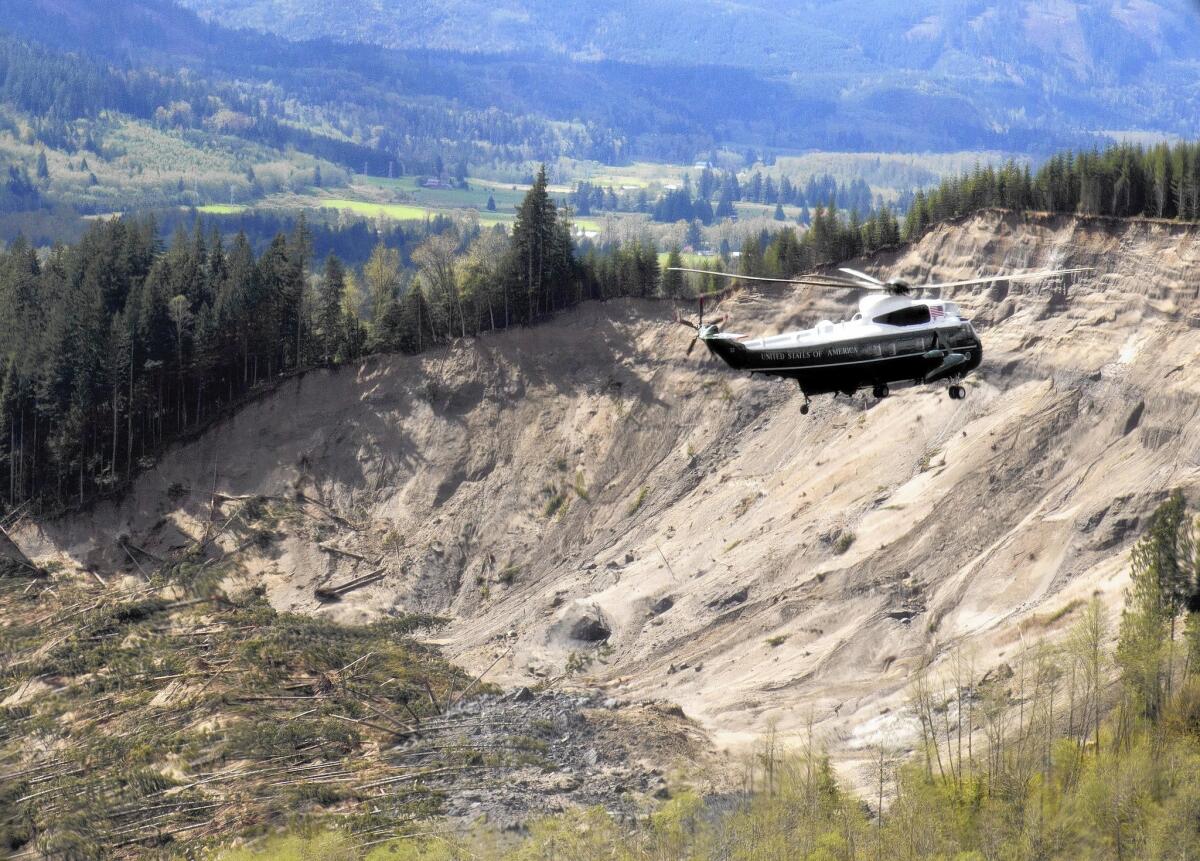Obama tours Washington mudslide devastation, praises rescuers

- Share via
OSO, Wash. — Standing beneath a banner proclaiming “Oso Strong” one month after the deadly landslide, President Obama told the residents of the hard-hit Stillaguamish Valley that the nation is grieving with them as they struggle to rebuild homes, businesses and families.
“There are still families who are searching for loved ones,” Obama said after an aerial tour of the devastation aboard the presidential helicopter Marine One and a visit with survivors and first responders. “There are families who have lost everything, and it’s going to be a difficult road ahead for them. That’s why I wanted to come here. To let you know that the country is thinking about all of you.”
The slide hit on a sunny Saturday morning, sending millions of cubic yards of mud and debris roaring down a hillside about an hour’s drive north of Seattle, flattening dozens of homes, closing crucial State Route 530 and largely cutting off the small town of Darrington.
Marine One flew directly over the square mile of devastation that first responders have dubbed “the pile,” giving the president a dramatic view of damage Tuesday.
The landscape was littered with ripped-up trees. A one-mile swath of highway had disappeared beneath the slide. Bright yellow excavators trundled across the pile, continuing the monthlong effort to recover bodies and belongings. An American flag flew at half-staff amid the wreckage.
Officials said this week that at least 41 people were killed in the fast-moving disaster, and two people remain missing. The highway is still covered in about 100,000 cubic yards of debris, and the state’s Department of Transportation estimates that it could take up to three more months to clear the roadway.
“We hope to have one lane of SR 530 with alternating traffic, local traffic, by this fall,” the department said on its website. “However, the roadway underneath the slide could be significantly damaged. It’s too soon to tell if the road will be drivable once the debris has been cleared.”
After the fly-over, Obama rode in a motorcade through the nearby rural town of Arlington, where dozens of residents lined the streets and waved. In one front yard was a pickup covered in football memorabilia and bearing the name Jovon Mangual.
The 13-year-old died of multiple blunt-force injuries in the March 22 disaster. So did his stepfather, Billy L. Spillers, 30, and his stepsisters Kaylee B. Spillers, 5, and Brooke Spillers, 2.
Shortly after the slide hit, the White House approved an emergency declaration so that state and local responders would have the resources they needed. Obama then declared a major disaster so that residents and business owners could rebuild.
Among the federal assistance made available, the Federal Emergency Management Agency announced this week that eligible survivors of the slide who were forced to make lengthy detours around the highway blockage for work, school or ongoing medical care could apply for help covering commuting costs.
The United Way of Snohomish County said that it had raised more than $2 million as of Tuesday morning for its Disaster Recovery Fund for Mudslide Relief and distributed nearly half of that to assistance efforts in the hard-hit towns. Individuals and families, the group said, have received nearly $400,000 in emergency cash allotments, gas cards and other support.
Obama spoke Tuesday afternoon to firefighters and paramedics at the Oso firehouse, whose walls were papered with signs thanking the search-and-rescue volunteers, including a 20-foot-long yellow banner covered with the handprints of elementary school students.
The president told residents that the nation had been inspired by the teamwork and resilience of this small patch of northwestern Washington.
“We’ve seen neighbors and complete strangers donate everything from chain saws to rain jackets to help with the recovery effort,” he said. “We’ve seen families cook meals for rescue workers. We’ve seen volunteers pull 15-hour days, searching through mud up to 70 feet deep.
“One resident said, ‘We’re Oso. We just do it,’” Obama recounted. “That’s what this community is all about.”
Obama also talked about a letter he had received from a firefighter — one of many missives from residents in the region. The firefighter wrote about how “those who were operating the heavy machinery during this whole process did so with an incredible care and delicacy,” the president said.
The reason? “Because they understood that this wasn’t an ordinary job, this wasn’t just a matter of moving earth,” he continued, “that this was a matter of making sure that we were honoring and respecting the lives that had been impacted.”
Many in the crowd of 75 said they had done nothing since the slide but search the pile, eat and sleep.
“We’ve been working together for weeks, but this is the first time I feel we’ve really come together,” said William Quistorf, chief pilot for the Snohomish County Sheriff’s Office, gesturing toward the Navy aviators sitting next to him. “It feels like part of a healing process.”
Half a dozen Americorps workers wearing brightly colored vests, their uniforms in the search-and-recovery effort, clustered in the back of the audience. For 14 days at a stretch, they have been mapping the area and installing pumps to drain water to make it easier to search.
For people who have been so consumed by the dirty, intense work, the president’s visit was a reminder that the outside world is still paying attention, said Derek Voelker, a Marine who served in Iraq in 2004 and 2005 before returning home to nearby Monroe.
“This day is kind of a marker, in a way,” Voelker said. “The work is starting to wrap up. Things are never going to get back to normal here, but we are moving on.”
More to Read
Sign up for Essential California
The most important California stories and recommendations in your inbox every morning.
You may occasionally receive promotional content from the Los Angeles Times.













